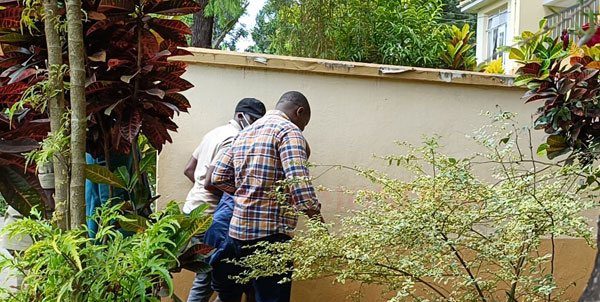News
Just In!! Bobi Wine’s Bodyguard Eddie Mutwe Dumped in Masaka, Unable To Walk

Ugandan opposition leader Bobi Wine has voiced serious concern over the condition and treatment of his longtime bodyguard, Eddie Mutwe, who was reportedly abandoned in Masaka and remanded to Masaka Main Prison in critical condition. According to Wine, Mutwe—whose real name is Edward Ssebuufu—was subjected to severe torture and is now suffering greatly, with journalists being denied access to assess or report on his wellbeing.
The National Unity Platform (NUP) president shared the alarming news via his official Twitter account, igniting widespread outrage across the country. His use of the word “dumped” suggests a calculated and callous disregard for Mutwe’s health and legal rights, underscoring what many see as an escalating crackdown on opposition voices in Uganda.
Mutwe is a familiar face in Uganda’s opposition circles, known for his unwavering loyalty to Bobi Wine and his visible role in political rallies and protests. Over the years, he has come to symbolize resilience and defiance within the People Power movement. This latest arrest, however, has taken a particularly disturbing turn.
Though Mutwe has faced arrest before—often during politically sensitive times—this incident stands out due to credible allegations of torture and deliberate efforts to shield his condition from public scrutiny. The reported denial of media access only fuels fears that his health may be deteriorating beyond what authorities are willing to admit.
Bobi Wine’s choice of language—describing his bodyguard as “dumped”—highlights the gravity of the situation. It implies Mutwe was cast aside without regard for due process, medical care, or basic human dignity. The attempt to keep journalists at bay raises even more questions about what the government may be trying to hide.
This episode appears to be part of a broader pattern of repression in Uganda, where opposition members frequently encounter harassment, violence, and arbitrary detention. Silencing the press only exacerbates concerns about rising authoritarianism and deteriorating human rights conditions in the country.
The situation has quickly drawn the attention of civil society. Activists, lawyers, and human rights groups are demanding immediate medical attention for Mutwe, as well as access by legal counsel and independent observers. The blackout surrounding his condition has intensified calls for transparency and accountability.
Amid growing public anger, one question dominates the conversation: why has a man, not yet convicted of any crime, been subjected to such inhumane treatment?
As the story unfolds, pressure continues to mount on Ugandan authorities to explain the circumstances surrounding Mutwe’s detention, the alleged torture, and the broader implications for political freedom in the country. In any democratic society, such actions should never be tolerated.


















